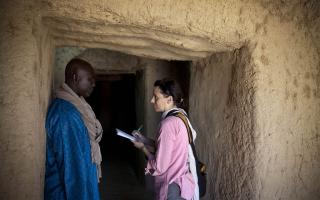UN System Behavioural Science Springboard Programme
Human behaviour is often unpredictable, shaped by various factors like biases and mental shortcuts. How can we further enhance our initiatives to account for this wide range of influences on behaviour?
Designed exclusively for UN personnel, our eight-week online 2025 UN System Behavioural Science Springboard Programme identifies tools, techniques and mindsets from across the system to tailor evidence-based interventions that work with, not against human behaviour.
Click here to download the timeline.
UN 2.0 envisions a modern, forward-thinking UN system equipped with cutting-edge skills suitable for the twenty-first century. To foster this transformation the "UN 2.0 Policy Brief" outlines a "Quintet of Change" with behavioural science identified as a key capability.
The focus of this programme is to provide concrete skills, guidance and tools to embrace behavioural science into the fabric of our work: to become simply, the way we do things.
Upon successful completion you will be able to:
- Discuss what Behavioural Science, Behavioural Insights and Behavioural Change is within a UN Context;
- Differentiate between System 1 and System 2;
- Identify drivers and barriers towards a desired behavioural outcome through a Behavioural Challenge;
- Identify how to obtain insights through diagnostic methods
- Recognize types of testing within Behavioural Science and the importance of evidence-based interventions;
- Develop storytelling and pitch capabilities/methodologies to improve communication and buy-in for behavioural interventions;
- Explore how to develop a vision and a strategy for transition and change related to the implementation of behavioural science efforts;
- Undertake coaching conversations with peers related to the scoping and design of behavioural science projects.
This programme provides seven hours of weekly learning, combining weekly webinars with self-study/paced modules; individual assignment; participant case presentations; and forum discussions as well as individual feedback and guidance. During the weekly webinars you will deepen your knowledge of concepts, and discuss contextualisation and application to your work in live collective activities.
Behavioural science project
- Throughout the programme, you will identify an existing behavioural science project within their sphere of influence. As next steps, you will utilise insights gained from the elements outlined below throughout the programme and develop a project plan/pitch to be presented at the final peer-coaching session.
During the programme, you will engage in the following elements:
Webinars
- Immerse yourself in weekly webinars, spread across eight weeks focused on key concepts around behavioural science, insights and change.
Individual assignments
- Define and scope your behavioural science project through two individual assignments and obtain personalized feedback from a coach.
Peer-coaching sessions
- Practice your coaching skills through four, two-hour coaching sessions and gain insights for your behavioural science project from colleagues across the system.
Online forum
- Engage in a moderated space for reflection, where you will be given a tool relevant to the theme of the week for you to share your experience with the rest of your peers.
Resources:
- Gain relevant pre-readings and materials to introduce and outline key concepts and processes from a UN context.
Self-paced modules
- Taking advantage of the UNSSC designed BlueLine self-paced learning platform, participants will be provided access to an optional UN 2.0 themed learning pathway during the contextualisation weeks.
Topics include:
- UN 2.0 Fundamentals E-Learning Path
- Managing Up
- Introduction to Change Management
In this programme, you will be exposed to the following content:
Week One: Introduction and Orientation
- Get to know the programme, your resource persons and peers!
Week Two: What is Behavioural Science?
- Define Behavioural Science and describe its importance within a UN Context
- Define what target behaviours are, and use methods to select and specify a target behaviour
Week Three: Behavioural Insights
- Discuss behaviour change frameworks and their applicability to a UN context
- Define behavioural barriers and drivers, and map them to theoretical models of behaviour change
- Identify and describe methods that can be used to diagnose behavioural drivers and barriers
Week Four: Intervention Design
- Discuss Behavioural Science frameworks for intervention design and and their applicability within a UN context
- Map behavioural interventions to specific barriers and drivers
Week Five: Build Your Strategy
- Describe the APEASE Framework and its applicability to the UN context
- Evaluate potential behavioural interventions using the APEASE criteria
Week Six: Experiment Design: Test and Learn
- Identify the importance of testing within a UN context
- Discuss types of testing (RCT, A/B, Pilots)
- Discuss the advantages and disadvantages of different types of testing
Week Seven: Storytelling and Pitch
- Identify the importance of storytelling and pitch within a UN context
- Identify and apply tools and frameworks for building a comparative narrative
Week Eight: Formulating a Case for Change
- Identify a strategy for change
- Examine a case for change and vision
- Utilize change impact analysis
All UN personnel at headquarters and field locations who are engaged in behavioural science or would like to deepen their knowledge on the topic.
This course is available for self-enrollment, or for groups nominated by a UN entity at a different price.
The Programme costs $2,500. The tuition covers:
• Preliminary Phase
- Learning needs assessment to customize the programme to your needs.
• Core Programme Phase
- Eight interactive webinar sessions with expert instructors;
- Four peer-coaching sessions to enhance your coaching skills and build your innovation case;
- Two assignments on your behavioural science project with individualized feedback;
- A curated moderated online forum to reflect on the learnings from the webinars;
- Readings and resource material that outline key concepts to refer to during and after the programme;
- Optional self-paced modules;
- Unlimited access to a curated online UNSSC e-lounge learning platform.
- Certificate of completion.




